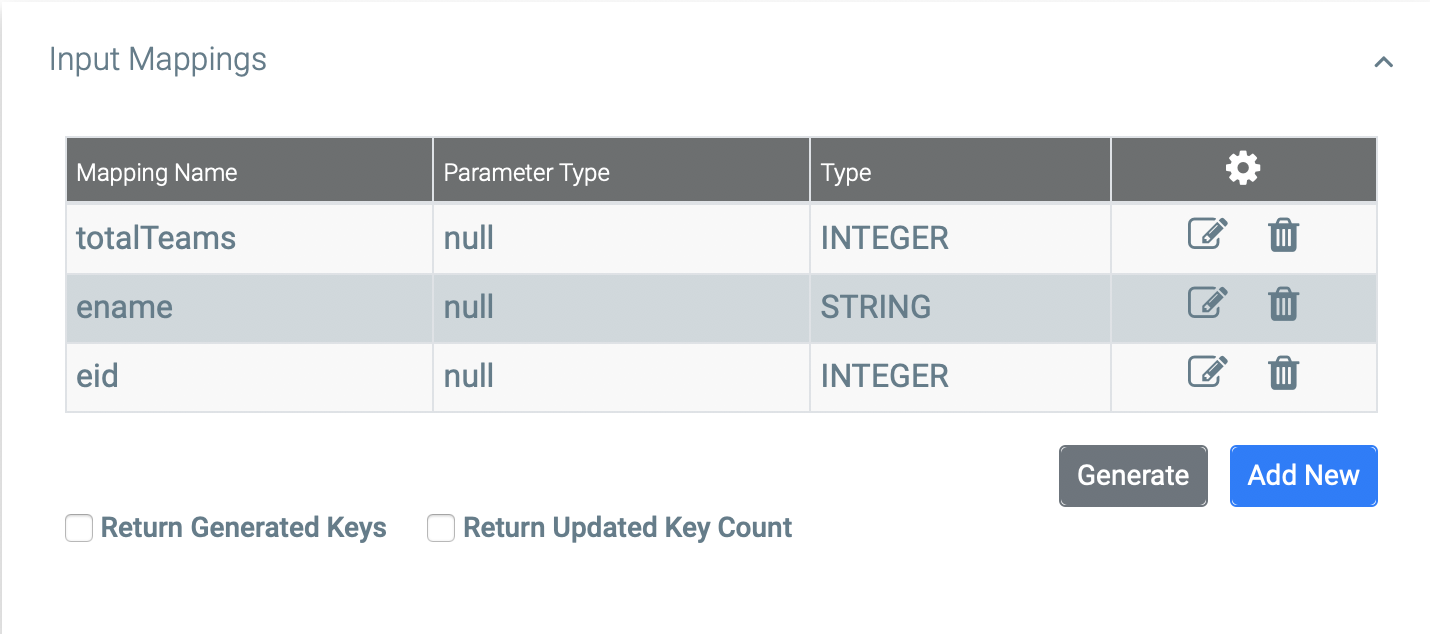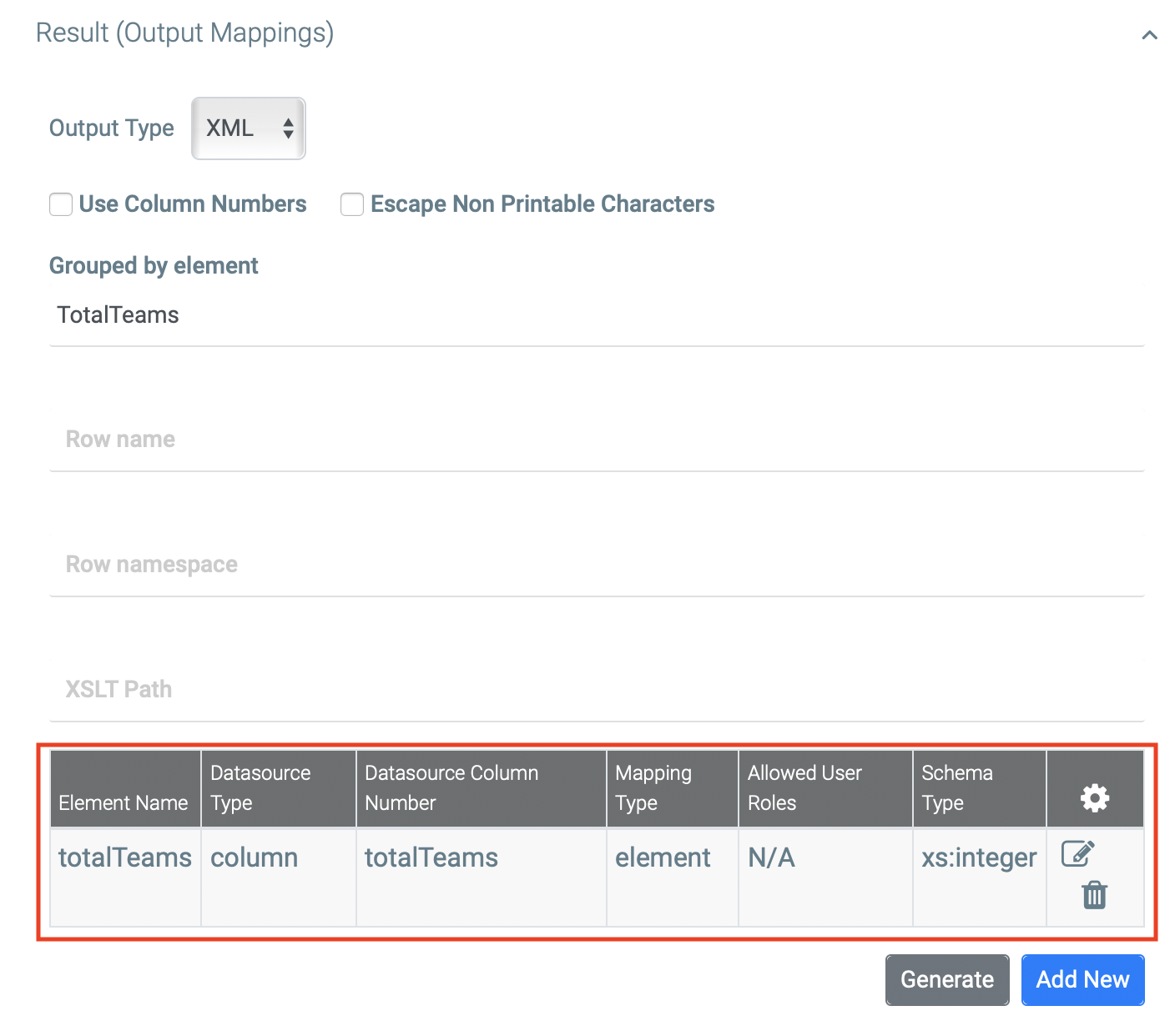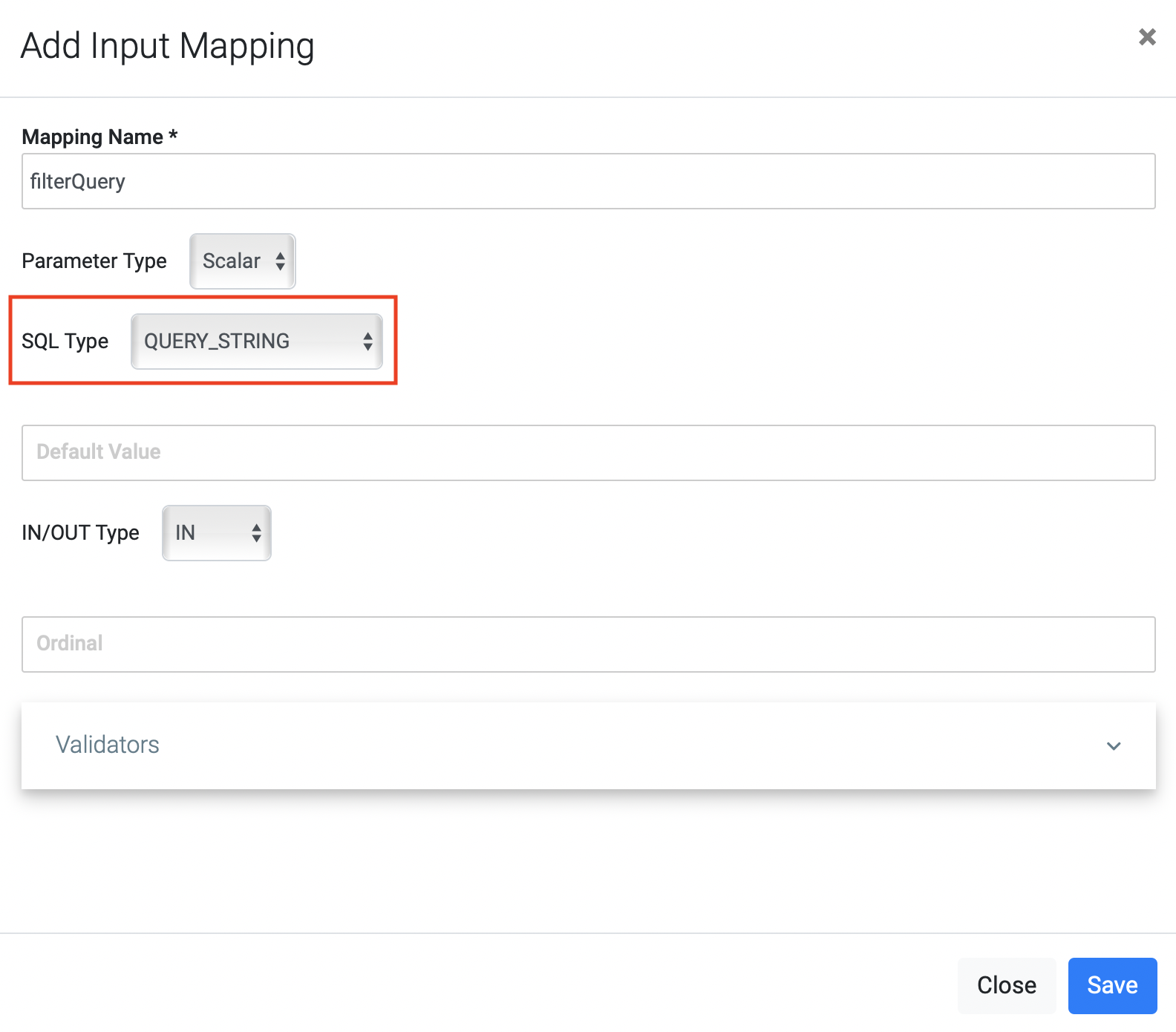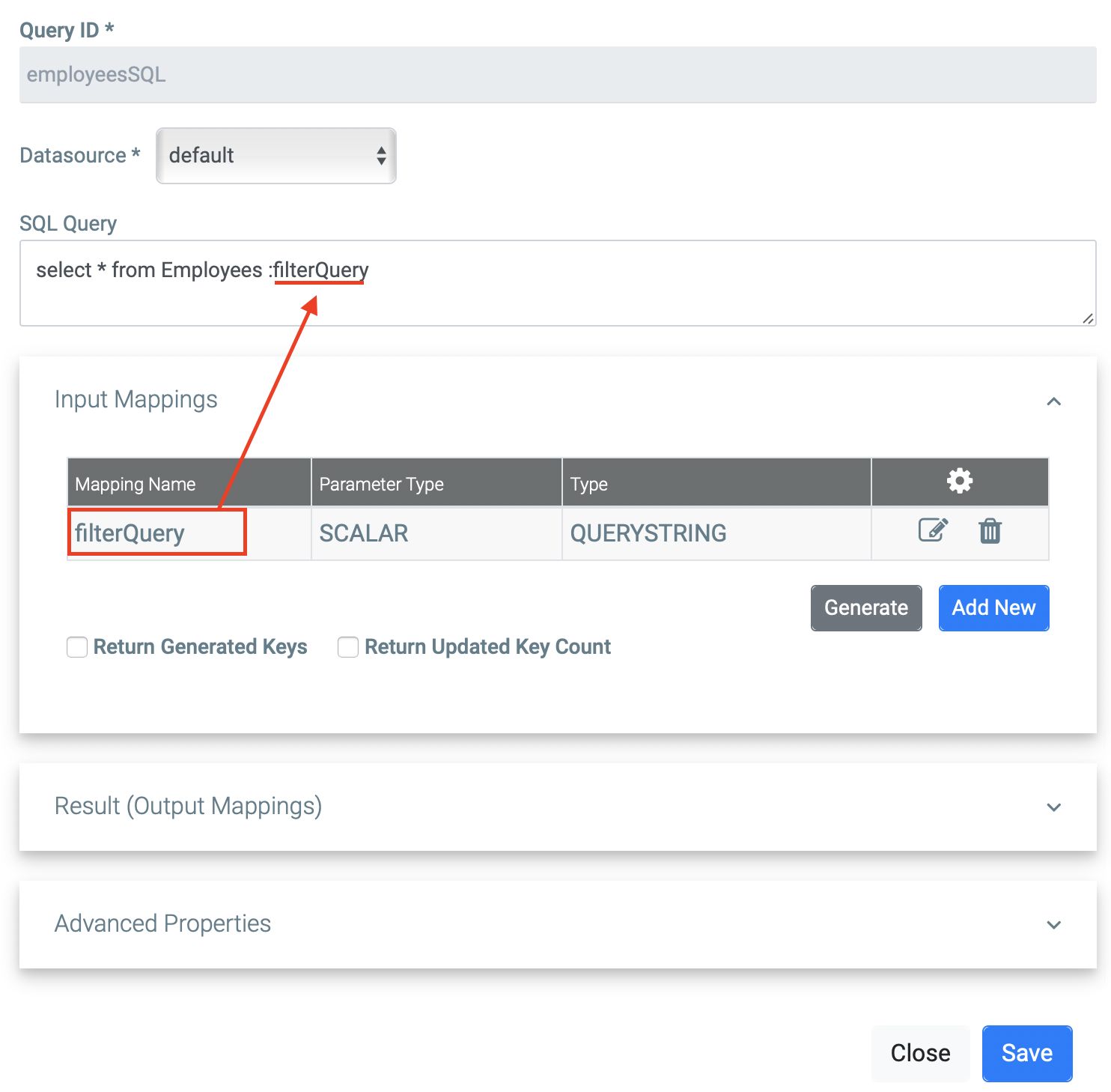Sample Queries¶
Listed below are some complex query definitions that you may require when defining an RDBMS data service.
Info
For detailed instructions on defining a data service using WSO2 Integration Studio, see Creating a Data Service.
Calling a MySQL function¶
Assume you have the following MySQL function, which takes a string parameter and returns the same as output.
Note
You need to create a database before executing the query.
create function myFunction(p_inparam varchar(20))
returns varchar(20)
begin
declare output_text varchar(20);
set output_text = p_inparam;
return output_text;
end
To call this function from the data service, create an RDBMS datasource (for your data service) that connects to the MySQL database, and then define a query with the following SQL statement:
select myFunction('WSAS') as ABC

The complete data service configuration (.dbs file) will be as follows:
<data name="sqlfunctionService">
<config id="mynew">
<property name="driverClassName">com.mysql.jdbc.Driver</property>
<property name="url">jdbc:mysql://localhost:3306/sample</property>
<property name="username">root</property>
<property name="password">root</property>
</config>
<query id="NewfunctionQuery" useConfig="mynew">
<sql>select myFunction('WSAS') as ABC</sql>
<result element="wsas" rowName="wsas">
<element column="output_text" name="n_param" xsdType="string"/>
</result>
<param name="imparam" sqlType="STRING"/>
</query>
<operation name="functionop">
<call-query href="NewfunctionQuery">
<with-param name="imparam" query-param="imparam"/>
</call-query>
</operation>
</data>
Calling an Oracle function¶
Assume you have the following Oracle stored function, which returns the total number of entries in a table:
CREATE OR REPLACE FUNCTION myfunction(ename IN VARCHAR, eid IN NUMBER) RETURN INTEGER
AS myCount INTEGER;
BEGIN
INSERT INTO TEAMS values(eid, ename);
SELECT COUNT(*) into myCount from TEAMS;
RETURN myCount;
END;
/
Create a table before executing the query as follows:
CREATE TABLE TEAMS(id INTEGER, team VARCHAR(30));
To call this function from the data service, create an RDBMS datasource (for your data service) that connects to the Oracle database, and define a query as given below.
-
SQL statement:
{call ?:=myfunction(?,?)}
-
Create three Input mappings as follows:
<param name="totalTeams" sqlType="INTEGER" type="OUT" ordinal="1" /> <param name="ename" sqlType="STRING" ordinal="2" /> <param name="eid" sqlType="INTEGER" ordinal="3" />
The first input parameter carries the return value of the function. The other two are inputs to the function. Note that you must define an Input parameter with OUT type to get the result of the function (i.e., the first parameter in the query above).
-
Create an Output mapping:
<result element="TotalTeams" rowName=""> <element name="totalTeams" column="totalTeams" xsdType="xs:integer" /> </result>
This output parameter gets the value as a result set from the data service.
For example, see the following data service configuration:
<data name="testOracleFunction">
<config id="or">
<property name="org.wso2.ws.dataservice.driver">oracle.jdbc.driver.OracleDriver</property>
<property name="org.wso2.ws.dataservice.protocol">jdbc:oracle:thin:user/pwd@localhost:1521/XE</property>
<property name="org.wso2.ws.dataservice.user">user</property>
<property name="org.wso2.ws.dataservice.password">pwd</property>
</config>
<query id="q1" useConfig="or">
<sql>{call ?:=myfunction(?,?)}</sql>
<result element="TotalTeams" rowName="">
<element name="totalTeams" column="totalTeams" xsdType="xs:integer" />
</result>
<param name="totalTeams" sqlType="INTEGER" type="OUT" ordinal="1" />
<param name="ename" sqlType="STRING" ordinal="2" />
<param name="eid" sqlType="INTEGER" ordinal="3" />
</query>
<operation name="op1">
<call-query href="q1">
<with-param name="ename" query-param="ename" />
<with-param name="eid" query-param="eid" />
</call-query>
</operation>
</data>
Defining a dynamic SQL query¶
Dynamic SQL queries allow you to change SQL queries (e.g., defining additional conditions in the SQL) in the runtime without changing the data service configuration. For this to work, you must specify the required SQL query statements (e.g., with WHERE clause) using the QUERY_STRING data type. These statements will be directed to the final SQL query during runtime.
Warning
Dynamic queries can lead to SQL injection attacks. Therefore, we recommend that the clients validate the values set using the QUERY_STRING data type during runtime.
The QUERY_STRING data type is available as an SQL type when creating Input mappings for queries:

You can add the SQL query using the mapping name:

Info
To avoid any errors, the value we pass to the query param must be URL encoded. You may refer to https://www.w3schools.com/tags/ref_urlencode.ASP and do the encoding.
For example, see the following data service configuration:
<data name="DynamicQuerySample" serviceNamespace="http://ws.wso2.org/dataservice/samples/rdbms_sample">
<config id="default">
<property name="driverClassName">org.h2.Driver</property>
<property name="url">jdbc:h2:file:./samples/database/DATA_SERV_SAMP</property>
<property name="username">wso2ds</property>
<property name="password">wso2ds</property>
<property name="minIdle">1</property>
<property name="maxActive">10</property>
<property name="autoCommit">false</property>
</config>
<query id="employeesSQL" useConfig="default">
<sql>select * from Employees :filterQuery</sql>
<result element="employees" rowName="employee">
<element column="lastName" name="last-name" xsdType="string"/>
<element column="firstName" name="first-name" xsdType="string"/>
<element column="email" name="email" xsdType="string"/>
<element column="salary" name="salary" xsdType="double"/>
</result>
<param name="filterQuery" sqlType="QUERY_STRING"/>
</query>
<query id="customerInCountrySQL" useConfig="default">
<sql>select * from Customers where country = :country :filter</sql>
<result element="customer-addresses" rowName="customer-address">
<element column="customerNumber" name="customer-number" xsdType="integer"/>
<element column="contactLastName" name="contact-last-name" xsdType="string"/>
<element column="contactFirstName" name="contact-first-name" xsdType="string"/>
<element column="addressLine1" name="address-line1" xsdType="string"/>
<element column="addressLine2" name="address-line2" xsdType="string"/>
<element column="city" name="city" xsdType="string"/>
<element column="state" name="state" xsdType="string"/>
<element column="postalCode" name="postal-code" xsdType="string"/>
<element column="country" name="country" xsdType="string"/>
</result>
<param name="country" sqlType="STRING"/>
<param name="filter" sqlType="QUERY_STRING"/>
</query>
<query id="insertUpdateQuery" useConfig="default">
<sql>:query</sql>
<param name="query" sqlType="QUERY_STRING"/>
</query>
<operation name="getEmployees">
<call-query href="employeesSQL">
<with-param name="filterQuery" query-param="filterQuery"/>
</call-query>
</operation>
<operation name="getCustomersInCountry">
<call-query href="customerInCountrySQL">
<with-param name="country" query-param="country"/>
<with-param name="filter" query-param="filter"/>
</call-query>
</operation>
<operation name="insertUpdateOp">
<call-query href="insertUpdateQuery">
<with-param name="query" query-param="query"/>
</call-query>
</operation>
</data>